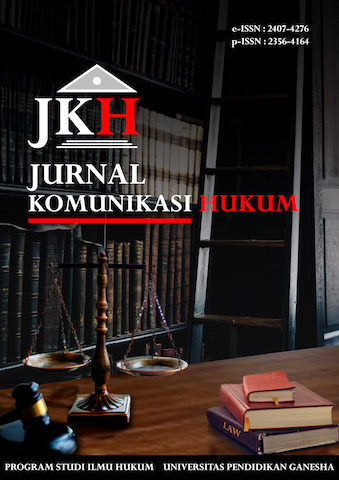WASTE BANK AS AN ALTERNATIVE TO COMMUNITY-BASED WASTE MANAGEMENT
DOI:
https://doi.org/10.23887/jkh.v8i2.47084Abstract
This study aims to (1) find out and analyze how the waste bank program is managed, and (2) find out and analyze how the benefits of the waste bank program are as an effort to empower the community. The type of research used is normative legal research. The data obtained from this study were secondary data obtained through a literature study, then the data obtained were analyzed qualitatively juridically through a statutory and conceptual approach. The results of this study indicate that (1) the Waste Bank in its implementation can reduce the high number of waste in the community and in the final disposal site (TPA). Thus, through the Waste Bank, it is an alternative solution for the government and the community in reducing the increasing volume of waste. (2) Community-based waste management as an approach to waste management based on the active participation of the community. Environmental management requires the facilitation and implementation of community-based efforts as a strategy for empowering and increasing their access to environmental resources. The benefit of the Waste Bank for the community is that it can increase people's income because when they exchange their waste they will get a reward in the form of money collected in the account they have.
Downloads
Published
How to Cite
Issue
Section
License
Authors who publish with this journal agree to the following terms:- Authors retain copyright and grant the journal right of first publication with the work simultaneously licensed under a Creative Commons Attribution License that allows others to share the work with an acknowledgement of the work's authorship and initial publication in this journal.
- Authors are able to enter into separate, additional contractual arrangements for the non-exclusive distribution of the journal's published version of the work (e.g., post it to an institutional repository or publish it in a book), with an acknowledgement of its initial publication in this journal.
- Authors are permitted and encouraged to post their work online (e.g., in institutional repositories or on their website) prior to and during the submission process, as it can lead to productive exchanges, as well as earlier and greater citation of published work (See The Effect of Open Access).
Authors who publish with this journal agree to the following terms:
- Authors retain copyright and grant the journal right of first publication, with the work [SPECIFY PERIOD OF TIME] after publication simultaneously licensed under aCreative Commons Attribution License that allows others to share the work with an acknowledgement of the work's authorship and initial publication in this journal.
- Authors are able to enter into separate, additional contractual arrangements for the non-exclusive distribution of the journal's published version of the work (e.g., post it to an institutional repository or publish it in a book), with an acknowledgement of its initial publication in this journal.
- Authors are permitted and encouraged to post their work online (e.g., in institutional repositories or on their website) prior to and during the submission process, as it can lead to productive exchanges, as well as earlier and greater citation of published work (See The Effect of Open Access).












